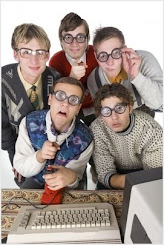0
Fast turnaround?
Posted by Chris
on
Friday, October 09, 2009
One of our earlier posts mentioned a small, quick turnaround project which was a cube-based interface.
A few hours down at The Skiff with Ben Ten of RobotBrighton and BuildBrighton fame, and a working prototype was made on a breadboard. The proof-of-concept was complete: a PIC microcontroller was coded to simply broadcast a message, when powered up, outputting a unique device ID, and a value from 1-6 to say which of six input pins were activated. The data was broadcast to an Arduino board using serial communication and it looks like the disco dice idea is off the blocks.
Over the coming few days, we'll inviting Ben to join the rest of the nerds, to build a tray/holder for the cubes, and actually developing some software to make use of this unique interface idea. Ben already has ideas for developing the cubes into a kit form, allowing people to make their own, at home, for very little cost.
This is an exciting little project which has a lot of potential - especially if handled correctly: a bit like an iPhone, what Ben's developing is really a platform, for which other people can write apps and use in any way they like.
Already we've discussed possible uses, including
There are probably loads of other things this could be used for.
The key thing now is to get one built and see if it lives up to it's promise!
A few hours down at The Skiff with Ben Ten of RobotBrighton and BuildBrighton fame, and a working prototype was made on a breadboard. The proof-of-concept was complete: a PIC microcontroller was coded to simply broadcast a message, when powered up, outputting a unique device ID, and a value from 1-6 to say which of six input pins were activated. The data was broadcast to an Arduino board using serial communication and it looks like the disco dice idea is off the blocks.
Over the coming few days, we'll inviting Ben to join the rest of the nerds, to build a tray/holder for the cubes, and actually developing some software to make use of this unique interface idea. Ben already has ideas for developing the cubes into a kit form, allowing people to make their own, at home, for very little cost.
This is an exciting little project which has a lot of potential - especially if handled correctly: a bit like an iPhone, what Ben's developing is really a platform, for which other people can write apps and use in any way they like.
Already we've discussed possible uses, including
- multi-track midi sequencer
- wav/mp3 based sample player
- puzzle games
- combination/puzzle lock
- interactive/digital board games
There are probably loads of other things this could be used for.
The key thing now is to get one built and see if it lives up to it's promise!




Post a Comment